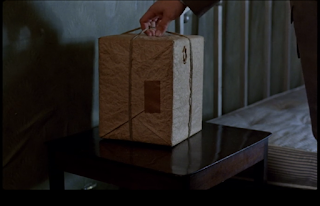Barton Fink:
I chose Barton Fink because I saw it once a while ago and liked it but wanted to watch it again. It's currently on Netflix and I watched in on my computer.
A review I read was written by Peter Travers for Rolling Stone. I was surprised by how much the review focused on the box that Charlie Meadows (John Goodman) gave Barton Fink (John Turturro.) While I felt the box was important, I saw it as more of a subplot rather than the focus of the story. The synopsis starts: "Charlie Meadows (John Goodman), a good-natured slob of a traveling salesman, has entrusted the mystery parcel to Barton Fink (John Turturro), a creatively blocked screenwriter who lives next door to him in a shabby Los Angeles hotel, circa 1942." By seeing how much Travers seemed drawn to the package, it definitely made me consider looking at the story in a way that focused more on the package. Travers also referred to the film as "partly hilarious, partly horrific" and I couldn't agree more.
http://www.rollingstone.com/movies/reviews/barton-fink-19910821
The second review I read was by Roger Ebert. Ebert brought up the Coen brothers tendency to powerful men behind desks making judgement calls. " All of these men are vulgar, smoke cigars, and view their supplicants with contempt." Ebert pointed out other examples the Coen brothers have utilized similar imagery and it made me think of Mr. Lebowski in The Big Lebowski, which came out several years after Barton Fink and the Roger Ebert review. Ebert seemed to focus a good deal on the dynamic of Fink dealing with Jack Lipnick (Lerner) across his desk, which again, made me think more about this perspective. Ebert also picked up on the Coen brothers tendency to write leftist characters, as I did with Barton Fink.
http://www.rogerebert.com/reviews/barton-fink-1991
The final review I read was written by Vincent Canby at The New York Times. Canby refrained from analyzing the depth of Barton Fink that other critics did. Canby focused more on the story at a surface level but acknowledged the prominence of proletarian playwrights in the early 1940's and the loose relation of Barton Fink and Clifford Odets and mentions Fink's commitment to the "Common Man." I felt like the review was very much so a brief newspaper review and potentially why the depth of analysis differed between the three reviews.
http://www.nytimes.com/movie/review?res=9D0CE1DA1F3EF932A1575BC0A967958260
Ethan and Joel Coen won the Cannes Palme d'Or, Joel Coen won the Cannes Best Director Award, John Turturro won the Cannes Best Actor Award, Judy Davis won the London Film Critics' Circle Award for Actress of the Year, Roger Deakins won the National Society of Film Critics Award for Best Cinematography, Turturro also won the David di Donatello award for Best Foreign Actor from the Italian Academy of Films. Barton Fink was also nominated for three Academy Awards but failed to win any.
Directors: Joel and Ethan Coen- I've seen several Coen films and there were certainly familiar themes but I felt the cinematography really stood out from other films of theirs.
Casting Directors: John S. Lyons and Donna Isaacson- Lyons has directing castings for many Coen films including The Big Lebowski, Fargo, Raising Arizona, and Miller's Crossing. Isaacson has directed castings is most the of Coen films that Lyons has. Considering they both have directed castings for several Coen films, it's not surprising that John Goodman and Steve Buscemi have been in several of them, along with Turturro.
Cinematographer: Roger Deakins- Deakins has been the cinematographer for many of the Coen films that Lyons and Isaacson worked on. Deakins has also worked on O Brother, Where Art Thou? and The Shawshank redemption. While I notice his tendencies to zoom in to dark places to create a transition and jarring close-ups, I felt like Barton Fink was some of the best work he's done, specifically with the typewriter scenes and when he zooms into the sink.
Writers: Joel and Ethan Coen. Joel Coen brothers has written a ton of movies including Fargo, No Country for Old Men, True Grit (2010), Burn After Reading, The Ladykillers, and Spies Like Us. Ethan Coen has writing credits on many of the same films.
NYT Interview: The Coen Brothers Look Wryly at Their Films
http://www.nytimes.com/2013/09/08/movies/the-coen-brothers-look-wryly-at-their-films.html?pagewanted=all&_r=0
This interview touches on many topics including their creative process, "Inside Llewyn Davis," technology, and success.
The thing that I found most interesting about Barton Fink related to the movie business was how much writers apparently had direct contact with studio heads. As far as I'm aware, rank and file writers have much less access to the people running the movie companies in current times. The film certainly relates to Hail, Caesar! being that it was written by the Coen brothers about the historic Hollywood. There's also the common theme of leftism in Hail, Caesar! with the leftist characters.
I personally enjoy the Coen brothers films a lot. I will certainly watch more of them and revisit some like Barton Fink that I haven't seen a million times like The Big Lebowski. I like the presence of leftists characters, I think it's an underrepresented part of American history that, for me, adds an interesting layer to their movies. The writing and story development is always superb. The Coen brothers also have a common theme of forceful police officers and main characters that have their simple lives disrupted and snowball into a complete chaotic mess.



No comments:
Post a Comment